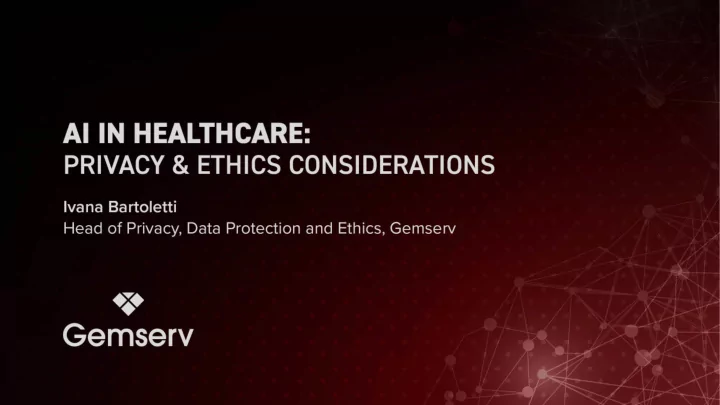

AI in Healthcare: Privacy & Ethics considerations Ivana Bartoletti – Head of Privacy, Data Protection and Ethics
Contents ▪ Privacy in the Digital age: main issues ▪ Ethics: definitions and background ▪ Privacy challenges in Health ▪ Ethics governance and framework ▪ Patient’s empowerment Gemserv 2
Data in the Digital Age TRANSPARENC PERSISTENC FAIRNESS ACCURACY PURPOSE Y E Gemserv 3
Recent Stories San Francisco becomes Target Figured Out A first U.S. state to prohibit Teen Girl Was Pregnant facial recognition by Before Her Father Did police forces Image: Matt Popovich on Unsplash Image: Tadas Sar on Unsplash COMPAS algorithm used Google shuts down AI in criminal justice found Ethics Board after to biased against African- criticised for appointment Americans of anti-LGTBQ figure Image: Andre Hunter on Unsplash Image: Pawel Czerwinski on Unsplash Gemserv 7
Public concern and expectations Behavioural Economics Context and Setting An individual’s desire for data An individual’s ‘reasonable privacy will depend on how they expectation’ of privacy will differ anticipate that data's effect on future depending on the context. economic outcomes. Variety of Solutions Transparency Different system setups used in data Individuals may not be aware of analytics – including connected how their personal data will be used, devices, AI systems and interfaces – particularly when algorithms or “black box” decisions are used. may collect and combine data to different effects. Gemserv 8
Existing regulation and standards Anti-discrimination law such as the Equality Act 2010 protects Human rights law such as the protects citizens from European Convention on Human discrimination on the basis of Rights (ECHR) provides for the basis of several grounds in the protection of human rights, in the employment, commercial including the right to privacy and commercial and other contexts. non-discrimination. contexts. Consumer law can be used to protect consumers from unfair services – e.g. dynamic pricing as a result of decisions informed by analytics or algorithms. Conclusion Gemserv 10
Key points Privacy: ▪ Limits to privacy as we know it? ▪ Does privacy as we know it stand in health? ▪ Consent vs transparency ▪ Public & private Terminology: ▪ The misleading narrative of empowerment ▪ Digital companions?
Key points Transparency: ▪ Explainability of algorithms: defining the trade offs ▪ Machine – human cooperation ▪ The human in the loop ▪ Bias & data accuracy Inferred data: ▪ Definitions ▪ Limits to use of inferred data: what is reasonable?
Governance Frameworks The following principles should be followed in the delivery of data analytics systems, including AI solutions: Organisations should ensure data Data Stewards governance such as by: Appropriate ‘data stewards’ should be • Appointing an Ethics Board assigned with responsibility for relevant responsible for oversight. processes in the deployment of AI systems – including for the sourcing of • Embedding collaboration between data, for the development or data scientists/developers and procurement of data processing operational management. systems, and for their use in business operations Gemserv 14
Algorithmic Impact Assessments Where new artificial intelligence (AI) systems and solutions are deployed, several standards identify that organisations should risk-assess the possible effects of their deployment. Training and Testing Organisations should consider: ❑ When training and testing AI systems, organisations should: ❑ Introduce procedures for checking for accuracy and data ❑ Potential for bias and the cleansing. ❑ Evaluate the impact of data analytics and profiling on groups meaning of ‘fairness’ ❑ Using external agencies to test of individuals . systems ❑ Using audit trails on databases and systems ❑ Compliance with industry Certification Schemes Gemserv 18
Human Autonomy Data analytics systems, particularly AI systems, should act as a complement rather than replacing human intuition: The following principles should be core to systems: COMPLEMENTARY ❑ The purpose or use of the system should functionally be limited to suggesting/scoring/ranking rather than deciding; HUMAN AGENCY ❑ The ability for a user (e.g. member of staff) to overrule and/or amend system decisions should be enabled ❑ The ability to audit decisions (e.g. to see if a particular AUDIT loan was approved by the system, and why) should always be possible 19 Gemserv
Summary
Any Questions?
Any Questions?
Recommend
More recommend